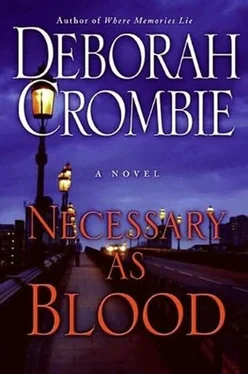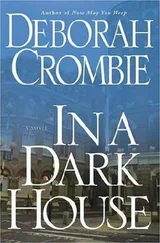This morning Ahmed Azad was dressed in a deep blue suit, perfectly tailored for his slightly plump frame. The fine fabric had the sheen of silk, as did his pink-and-blue-striped tie. He was freshly shaved and smelled strongly of bay rum.
Louise Phillips, on the other hand, looked haggard and hollow-eyed, as if she hadn’t slept, and her rumpled black suit was liberally speckled with what looked to Kincaid like dog hair.
“Thank you for coming,” he said when they were all settled with their cups. Singh had made the coffee, and it was strong but good.
“Very considerate of you.” Azad sipped his coffee and nodded his approval. “One appreciates that, Mr. Kincaid. There is no reason why we cannot talk in a civilized manner.”
“Oh, I agree, Mr. Azad. Completely. And I appreciate your taking the time from your busy schedule to clear up some things for us.”
Singh’s eyes had widened. Kincaid flashed her a smile. She was obviously more accustomed to Weller’s interrogation methods. Not that Kincaid was averse to playing bad cop when it suited him, but he’d read Azad as the type to respond more willingly to flattery than force.
“And you, Ms. Phillips?” he asked, turning his attention to her. “How are you coping?”
“I’m here representing my client, Superintendent.” Her voice was sharp, and she sat stiffly in her chair, her coffee untouched. Clearly, she was not going to consider this interview a social occasion.
Kincaid carefully replaced his cup on the low table. “Now, Mr. Azad. Since you’ve come in, perhaps you wouldn’t mind telling us when you last spoke to Naz Malik.”
“Let me see. That would have been on Wednesday last week. Or was it Thursday? Yes, I believe it was Thursday.”
“All right, Thursday then. Was this at Mr. Malik’s office?”
“No, no, Nasir came by the restaurant. We spoke in my office there for just a few moments. Not long enough, it seems now,” he added, his voice heavy with regret.
“And why did Mr. Malik want to see you?” Kincaid asked easily, but he saw Louise Phillips tense.
“Mr. Azad does not have to-”
Azad cut her off with a wave of his hand. “There’s no reason I should not be frank with the superintendent, Louise. Yes, Nasir and I talked about my nephew, if that is what you are wanting to know. Actually, the young man is my great-nephew, the son of my favorite niece in Sylhet. I told Nasir that I did not know where my nephew had gone. Nor did I believe this nonsense story that Mohammed meant to testify against me. He is a foolish young man, yes, but he is not that foolish. All he would gain by such a thing is deportation, and the bringing of shame on his family.” Azad’s tone implied that the latter was by far the worst consequence.
“But if Naz believed your nephew meant to testify against you, he might have thought you had good reason to-let’s say, help your nephew disappear.”
“Nasir would never have suggested such a thing,” said Azad, his chin quivering with his disapproval. “He understood the importance of family. He was merely…concerned for the well-being of my relative.”
“So you didn’t argue with Naz about your nephew that day?” Kincaid asked.
“No. You can ask my staff if you feel it necessary.”
“Did you argue with Naz on the day he disappeared?”
Louise Phillips moved abruptly. “That’s enough, Superintendent. I can’t allow-”
“I did not see Nasir again,” Azad said, interrupting her once more. Kincaid wondered why he had insisted on her accompanying him. “Saturday is our busiest day at the restaurant. I was there from before lunch until well after closing on Saturday night. And I had no reason to argue with him. He was my friend as well as my attorney.” Azad’s round face seemed to sag with melancholy. He finished his coffee, tipping back the small cup to catch the last drop. When he’d placed the empty cup on the table, he brushed his hands against the knees of his trousers. The “game over” signal was as clear as a banner. “Now, Mr. Kincaid, is there anything else?”
“I think he’s lying,” said Sergeant Singh when Azad and Louise Phillips had left the room. She’d followed the conversation carefully, watching alertly even as she took notes.
“Oh, I think our very urbane Mr. Azad is certainly lying,” Kincaid agreed. “But the question is, what is he lying about? Does he know what happened to his nephew? Did Naz accuse him of getting rid of the inconvenient nephew? Did he see Naz again? Or is it something else altogether? And why did he drag Louise Phillips along for that dog-and-pony show-unless it was for her benefit rather than ours?” He thought for a moment. “See if you can catch Ms. Phillips, why don’t you, Sergeant? I think I’d like a word with her on her own.”
“You know I can’t discuss my client’s affairs with you,” Louise Phillips said when Singh brought her back into the small office. She smelled strongly of smoke, and Kincaid guessed Singh had caught up with her in the street as she’d stopped to light a cigarette.
“Thank you, Sergeant.” Kincaid dismissed Singh with a smile, then turned to Phillips. “I realize that. But you can discuss Naz Malik’s.” He motioned her back into the chair she had so recently vacated. “Would you like that coffee now? I think the pot is still hot.”
She glared at him, but after a moment, she sank back into the chair and sighed, as if she were too tired to keep up the bristling posture. “Yes, all right,” she said, accepting a fresh cup. “I’ve been trying to give it up. My doctor says my blood pressure is sky high. But with Naz gone, it seems a bit stupid to be worrying about things like caffeine and blood pressure.” Shrugging, she added, “What difference does it make, if you can walk out of your house and end up dead in a park? Or get blown up on a bus? Or get shot in the tube?” She shook her head, then drank half the cup as if she was fiercely thirsty.
“In that case, why don’t you tell me whether or not Naz believed Azad did away with his nephew-excuse me, great-nephew. That would explain why Naz suddenly decided he wanted to drop Azad’s case. And then you can tell me if you think Azad is capable of having got rid of Naz, if Naz had learned he was responsible for getting rid of said nephew. A bit convoluted, but you follow. And you notice I’m not asking if Azad is guilty as charged.”
“I thought you said we weren’t going to talk about Azad,” Phillips countered, but with the faintest suggestion of a smile. “Although I do appreciate the thread of your argument.”
“Merely following your lead. And we are talking about Naz.”
“Quite. But I’m afraid, Superintendent, that I can’t tell you what Naz thought, because I don’t know.” She drank more of her coffee. Already the caffeine seemed to have given her more energy. “If you want my opinion, however-completely off the record-I don’t believe Azad harmed his nephew. I do think the old sod’s quite capable of slipping the boy out of the country in the back of a truck and sending him back to his mum in Sylhet for a good bollocking.” She reached for her bag, an automatic gesture, then drew her hand back. “I do not think that Azad would have had any part in harming Naz. Azad has his own code of loyalty. I don’t know if I fit into it, but I think Naz did. And I think Sandra did, too.”
“So who does benefit from Naz’s death, then, if not Azad? Did Naz have a will?”
Phillips rolled her eyes. “Naz was a lawyer. Of course he had a will. I’m the executor. Naz and Sandra both left everything in trust for Charlotte.”
“But they didn’t name a guardian?”
“No. That was the thing, you see.” She rubbed at one of her ragged cuticles. “It was…awkward. They couldn’t make a decision. There was no one they trusted.”
Читать дальше












